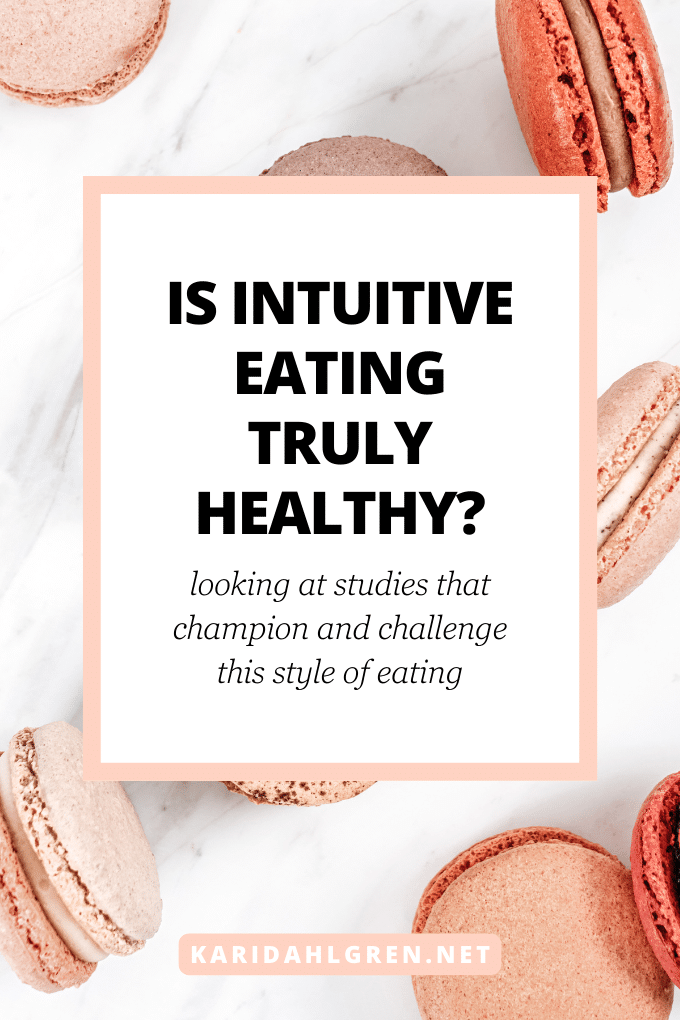
Intuitive eating moves away from restrictive diets and focuses on listening to your body to guide your food choices. While it promises more sustainability than restrictive diets, a lingering question remains: is intuitive eating healthy?
The opposite of intuitive eating would be any kind of restrictive diet, which is often marked by “weight cycling,” or continuously gaining and losing weight. Weight cycling and yo-yo dieting are known to have detrimental effects on physical and mental health.[1], [2] Many of us have experienced it first-hand, myself included, and intuitive eating offers solace from this struggle.
However, intuitive eating is complex, and though plenty of research supports it, some studies provide valid criticisms against it. To address the pivotal question, is intuitive eating healthy?, I dug through an array of clinical studies, unraveling the evidence that both champions and challenges intuitive eating. My aim is to present the evidence on both sides so that you can make your own informed decision.
What Is Intuitive Eating?
Intuitive eating encourages you to listen to your body and honor your natural hunger and fullness cues rather than strictly adhering to external diet rules. At its core, intuitive eating is about establishing a harmonious relationship with food, one that respects the body’s innate wisdom.
While diet culture labels different foods as “good” and “bad”—a mindset vividly illustrated by the popular book Eat This, Not That—intuitive eating seeks to break these constructs and view all foods neutrally. This helps reduce the psychological toll of constantly straddling the line between feeling good for “eating well” and feeling guilty for “eating bad.”[3]
While the phrase ‘intuitive eating’ was popularized by Evelyn Tribole and Elyse Resch in their book Intuitive Eating, my personal introduction to this concept was actually Geneen Roth’s book Women, Food, & God. No matter who you turn to, the message is clear: eating exactly what appeals to you when you’re hungry and stopping when you’re full is the surest path towards reaching your natural weight.
Of course, this is an oversimplification as there are entire books on the topic, but that’s the high-level proverbial nutshell. Instead of restricting foods, intuitive eating allows all foods and encourages participants to focus on listening to their bodies.
To some people, however, intuitive eating seems too good to be true, begging the question, is intuitive eating healthy? Let’s dig into some common points of skepticism.
What Sparks Concerns About the Health Implications of Intuitive Eating?
Intuitive eating encourages a profound shift from away from traditional dieting, which places many foods off-limits, and instead encourages permission to eat whatever foods sound appealing. As you can imagine, this paradigm shift often raises concerns and skepticism.
Here are some of the most common apprehensions people have about intuitive eating:
-
Does intuitive eating promote unhealthy food choices? While intuitive eating technically gives free rein to indulge in “junk food,” does that make the program unhealthy? In reality, the absence of forbidden foods reduces the allure and subsequent overeating associated with restrictive diets.[4]
-
Will intuitive eating leads to constant eating? Some people worry that without structured meal times or portion sizes, intuitive eating will lead to non-stop eating. However, one of the tenets of intuitive eating is honoring your body’s fullness, which contradicts this concern.
-
Can intuitive eating help with weight loss? Many people worry that intuitive eating won’t help with weight management goals, and I don’t blame them. Too many intuitive eating coaches forbid the desire to lose weight (which I discuss later on) which contradicts one of intuitive eating’s goals of alleviating guilt.
-
Is intuitive eating healthy if it ignores nutritional guidelines? Intuitive eating aligns with nutritional well-being by encouraging you to explore how different foods make you feel and how they contribute to your health. It’s called gentle nutrition, which embraces that all foods can fit into a balanced diet, and it’s one of the core tenets of intuitive eating.
In the following section, we’ll delve deeper into how intuitive eating effectively addresses these concerns, backed by clinical evidence. Before we dive in, I have a quick distinction that I’d like to make.
Within my practice as an eating psychology coach, my ideology overlaps with intuitive eating but is distinctly different. Intuitive eating places a greater emphasis on self-care and gentle nutrition while I place a much greater emphasis on eating psychology and spirituality (aka, my philosophy, Psycho-Spiritual Wellness).
Is Intuitive Eating Healthy? Looking at Clinical Studies
Plenty of clinical evidence supports the benefits of intuitive eating as it improves both mental and physical health. However, some research stands against intuitive eating, so it’s important to consider all sides when answering the question, is intuitive eating healthy? I am not going to try to convince you either way. Rather, I’m simply going to prevent all the evidence I found so that you can decide for yourself.
Here are five themes that emerged from the clinical evidence surrounding intuitive eating:
1. Intuitive Eaters Consume More Fruits and Vegetables Than Dieters

A study published in the Journal of Nutrition Education and Behavior found that intuitive eating naturally lead to healthier food choices, especially when it comes to eating more fruits and vegetables.[5] The study found that women who are good at intuitive eating eat more fruit, and both men and women eat more vegetables, compared to dieters (restrained eaters).
If you asked the researchers who conducted this study, is intuitive eating healthy?, they might be inclined to say yes based purely on the metric of fruit and vegetable consumption. But is it fair to connect those two dots? I’ll let you decide for yourself, as another study states, “Fruits and vegetables have potential health-promoting effects beyond providing basic nutrition needs in humans, including their role in reducing inflammation and their potential preventive effects on various chronic disease states.”[6]
2. Intuitive Eaters Have Better Body Satisfaction and Self-Esteem than Dieters
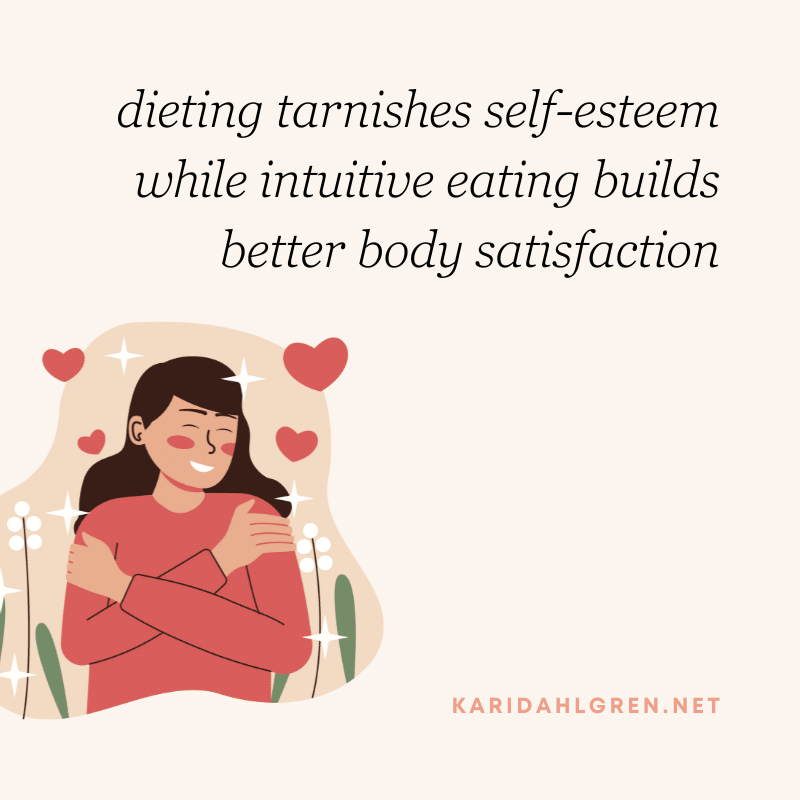
A study published in the Journal of the Academy of Nutrition and Dietetics found that intuitive eaters generally report higher levels of body satisfaction and self-esteem compared to those who adhere to traditional dieting approaches.[7] This phenomenon is thought to stem from the non-restrictive nature of intuitive eating, which fosters acceptance and respect for the body, rather than viewing it through the critical lens often associated with diet culture.
By shifting the focus from weight control to honoring internal cues of hunger and fullness, intuitive eating supports a more compassionate, self-accepting relationship with one’s body, contributing to overall psychological well-being and a positive self-image. To relate this back to our original question, is intuitive eating healthy, this study encourages us to view health through a new lens: how much does better body satisfaction affect physical health?
According to another study published in The International Journal of Eating Disorders, poor body satisfaction was linked with an increased risk of developing an eating disorder.[8] Eating disorders are serious and often devastating conditions that can have far-reaching effects on physical health, emotional well-being, and overall quality of life. In this context, intuitive eating can be considered profoundly healthy as it inherently promotes better body satisfaction.
3. Intuitive Eating Improves Metabolic Fitness
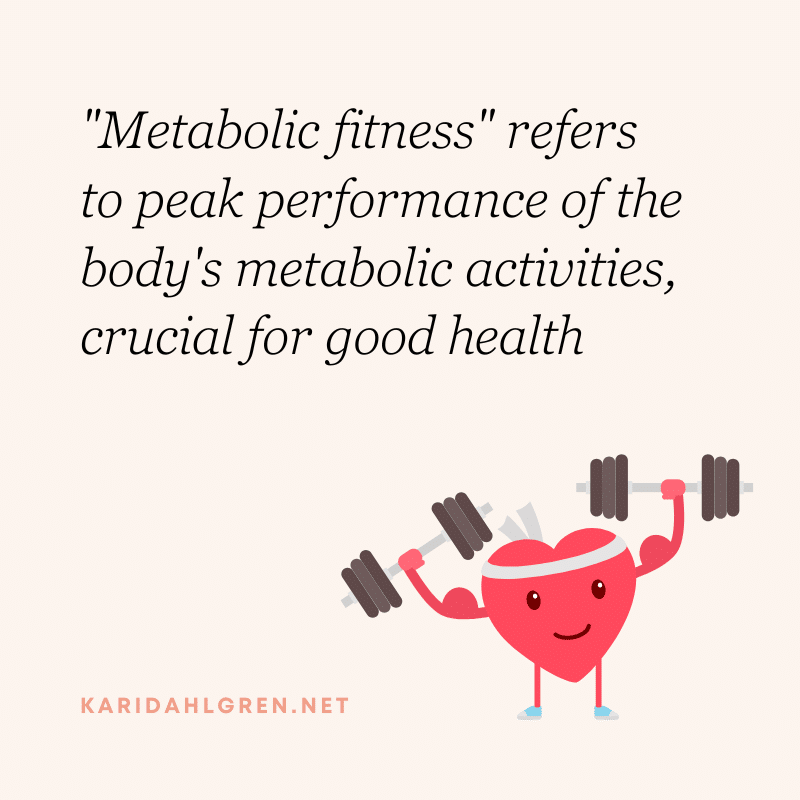
While intuitive eating prioritizes psychological health and body attunement over strict dietary control, it has also been associated with improved metabolic fitness. The review published in the Journal of the Academy of Nutrition and Dietetics highlights that engaging in intuitive eating can help individuals abandon harmful weight control behaviors, potentially leading to better metabolic outcomes.[7]
However, intuitive eating is not positively correlated with all dimensions of physical health, such as physical activity levels. A comprehensive review published in Public Health Nutrition reveals that while intuitive eating is associated with improved psychological health and may positively influence metabolic health markers, it doesn’t consistently correlate with higher levels of physical activity.[9]
Similarly, another study published in Eating and Weight Disorders links intuitive eating with improved psychological health and reduced disordered eating behaviors; but it doesn’t explicitly link intuitive eating to increased physical activity. These insights highlight that while intuitive eating clearly supports mental and physical health, its influence on physical activity in particular isn’t as straightforward.[10]
4. Anxiety and Depression Decrease with Intuitive Eating & Increase with Dieting
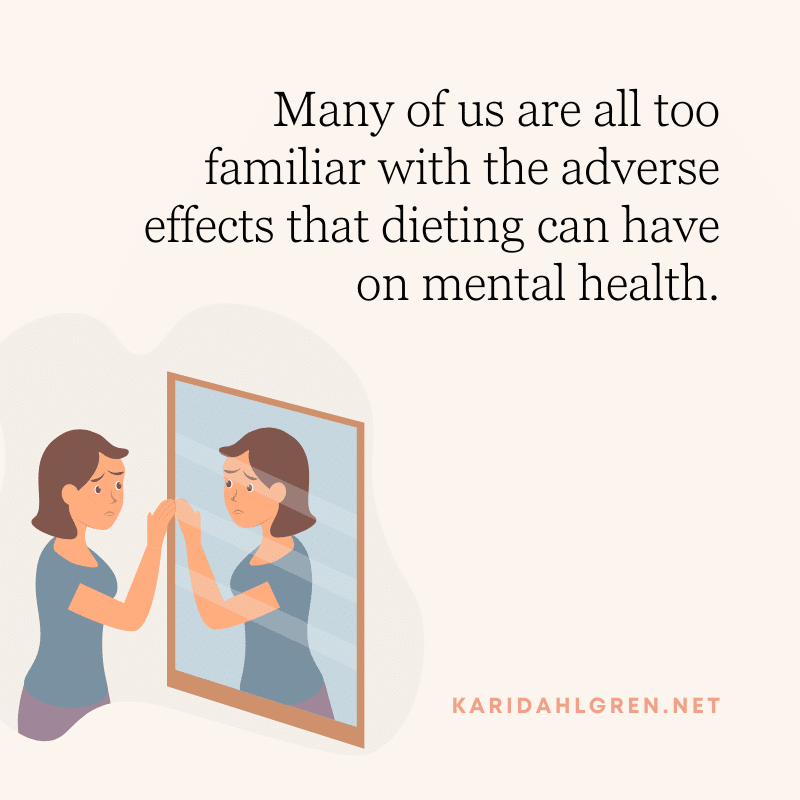
The psychological benefits of intuitive eating extend beyond self-esteem and body satisfaction. Research, including that study published in Eating and Weight Disorders, indicates a strong link between intuitive eating and lower levels of anxiety, depression, and disordered eating behaviors.[10] This is not too surprising given that restrictive dieting is correlated with depression and body dissatisfaction.[11], [12]
Those who practice intuitive eating are less likely to experience high depressive symptoms, low self-esteem, and unhealthy weight control behaviors, suggesting that intuitive eating promotes not just physical health but also psychological resilience and emotional health too. The protective associations against behaviors like binge eating further underscore that, yes, intuitive eating is healthy.
5. Intuitive Eating May Not Help with Weight Loss—Health Perspectives Go Beyond the Scale
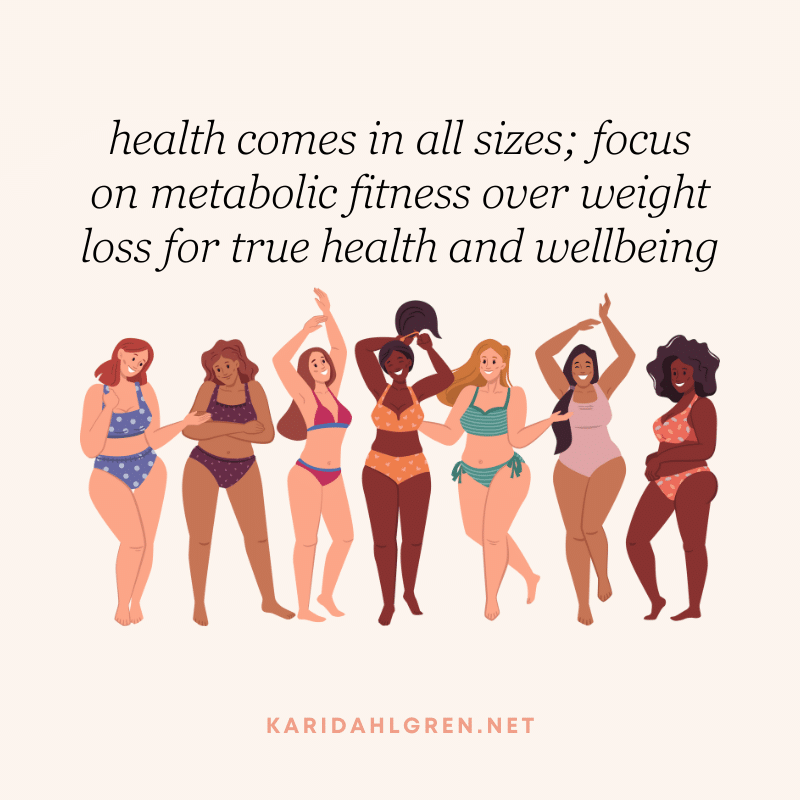
Some critiques against intuitive eating claim it doesn’t help with weight loss, which makes it a poor fit for individuals who require weight loss for medical reasons. However, “intuitive eating is negatively associated with BMI.”[9] This means that as intuitive eating practices increase, Body Mass Index tends to decrease.
Keep in mind that BMI is a very poor indicator of health, as a muscular individual can be miscategorized as overweight even if they are healthy.[13] It’s crucial to recognize that health is multi-dimensional and cannot be accurately measured by weight alone.
Still, the relationship between intuitive eating and weight loss is complex and nuanced. While some individuals might experience weight stabilization or loss as a natural outcome of intuitive eating, others may not. A randomized controlled trial published in Nutrition and Health emphasizes that intuitive eating may not consistently lead to weight loss when compared to calorie-restrictive approaches.[14]
However, it’s also crucial to recognize that calorie-restrictive approaches to weight loss generally work short-term. In fact, and abundance of clinical evidence links calorie restriction with long-term weight gain, not weight loss.[15], [16], [17] Weight is not a sole indicator of health, so I mentioned these studies to provide arguments on both sides of the question, is intuitive eating healthy?
Does Intuitive Eating Capture the Full Picture?
By now, you might be convinced that intuitive eating could be a healthier alternative to dieting. But before you dive into a brand-new style of eating, it’s important to understand some areas where I believe intuitive eating falls a bit flat.
For one, some intuitive eating coaches believe that one must abandon any hope of losing weight in order for intuitive eating to work. I wholeheartedly disagree and believe that individuals can desire weight loss while still working on a better, more intuitive relationship with food.

Another potential problem with intuitive eating is turning it into the “hunger and fullness diet.” Intuitive eating is about much more than listening to your body. It involves cultivating a holistic understanding of your personal health and wellness, where food choices are guided not just by physical cues, but also by emotional well-being and a profound respect for your body.
Intuitive eating is about recognizing and honoring your body’s signals, but also giving yourself unconditional permission to eat without guilt or strict constraints. Intuitive eating encourages a mindful approach to food, where each eating experience is savored and appreciated, and where one learns to cope with emotions without using food as the primary tool.
That said, I also think that many people in the intuitive eating sphere confuse “feeling your feelings” with self-care, which plasters a mere Band-Aid over the problem of emotional eating. Self-care is a coping mechanism that, while valid and absolutely encouraged, does not promote tolerance for the emotions that drive compulsive eating, which is a core psychological trigger for overeating.[18]
Is Intuitive Eating Healthy? It’s Up to You to Decide What’s Best for You
Overall, clinical research indicates that intuitive eating is linked with enhanced psychological well-being, including lowered depression and anxiety, while positively influencing key indicators of metabolic health and even decreasing BMI in some cases, but not all. While intuitive eating seeks to solve problems created by diet culture, there is a glaring gap where the program fails to adequately address the psychology of overeating.
Even though intuitive eating doesn’t solve every issue related to eating behaviors, its success in promoting psychological health and fostering a more mindful, body-positive approach to eating is a testament to its overall merit. I hope that you’ll decide for yourself: is intuitive eating healthy? Yes or no? Leave me a comment below to share your thoughts!
Also, I invite you to learn more about my approach to stopping compulsive eating, Psycho-Spiritual Wellness, which has much in common with intuitive eating but is distinctly different because it bridges the gap. A great next step would be downloading my free ebook below which explains everything:



